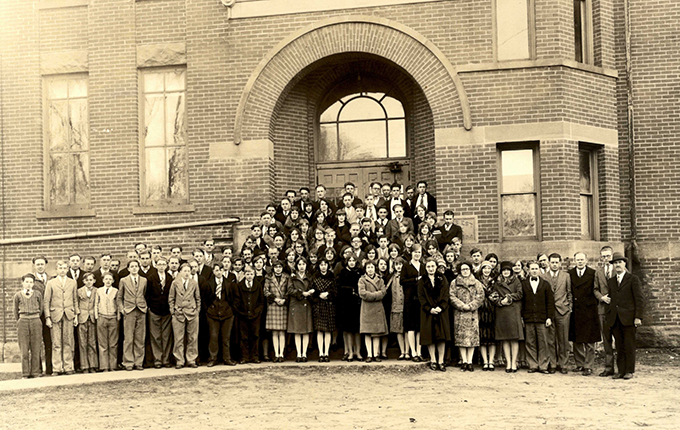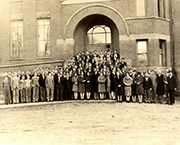Closed Call
BY ANITA CIRULIS

Northwestern College Archives
Faculty and administrators of Northwestern Junior College and Academy—including President Jacob Heemstra, third from right—pose with students in front of Zwemer Hall a few years after the RCA’s Board of Education proposed closing the school.
In July 1932, trustees of Northwestern Junior College were first blindsided—and then incensed—by a letter from the Reformed Church in America’s Board of Education.
The board recommended the fledgling institution close temporarily, “for a year or two” or until the country and RCA emerged from the Great Depression and gifts to the Board of Education increased. The board also proposed that students of Northwestern Junior College be sent to another of the denomination’s colleges, Central College in Pella, Iowa.
“Central College has been approached by this board on this subject,” wrote education board secretary Willard Dayton Brown, “and through its president … has agreed to take care of the students … if this proposition be acceptable.”
It wasn’t. The Board of Trustees of Northwestern Junior College and Academy fired off a five-page, single-spaced reply that emphatically rejected the proposal. They were surprised, the letter said, that the Board of Education would entertain such an idea—“even more so that you should discuss such a matter as the closing of this institution with Central College before even communicating this idea to us.”
The trustees reminded the Board of Education that the denomination authorized the establishment of Northwestern Junior College at the RCA’s General Synod in 1928, formally adopted it in 1931, and voted it aid in 1932.
It was perhaps an appeal for that aid that led to the board’s drastic proposal. In his June 2, 1932, Report to the General Synod, Northwestern President Jacob Heemstra pressed for the promised funding. A month earlier, Northwestern Classical Academy alumni had drafted a petition for more financial support, reminding the Synod that Sioux County residents had loyally given to denominational institutions Hope College and Western Theological Seminary, as well as raised $80,000 from area churches for a Central College fundraising campaign.
Central was a particular focus of the Northwestern trustees’ ire. Comparing the two colleges, they noted Northwestern was better situated geographically to serve the RCA and that a larger percentage of its student body came from Reformed families. They reminded the board that, unlike Northwestern, Central didn’t begin as a Reformed college.
Closing the junior college, they wrote, would also mean closing Northwestern Classical Academy, which during its 50-year history had produced 118 ministers and 30 missionaries.
Faced with firm resistance, the Board of Education backed away from its proposal, and in March 1933, the junior college received a check for $566.65. Though the academy eventually did close in 1961, the same year the junior college became a four-year institution, Northwestern College continues to produce standout graduates decades after its existence was threatened—all due to the refusal of those who loved her to abandon her cause.
 Meet 10 alumni who are leading lives of significance. As they heal bodies and minds, spread the gospel and empathy, and fight human trafficking and pornography, they stand out.
Meet 10 alumni who are leading lives of significance. As they heal bodies and minds, spread the gospel and empathy, and fight human trafficking and pornography, they stand out. For 25 years, Northwestern athletes have been making Raider Magic in the Bultman Center. Here are some of the most memorable moments.
For 25 years, Northwestern athletes have been making Raider Magic in the Bultman Center. Here are some of the most memorable moments. High school psychology teacher Ali Ter Horst won $25,000 for inspiring students through innovative instruction, high expectations and vulnerability.
High school psychology teacher Ali Ter Horst won $25,000 for inspiring students through innovative instruction, high expectations and vulnerability. When Reformed Church leaders suggested in 1932 that Northwestern Junior College close temporarily, the Board of Trustees responded with an emphatic no.
When Reformed Church leaders suggested in 1932 that Northwestern Junior College close temporarily, the Board of Trustees responded with an emphatic no.
Classic Comments
All comments are moderated and need approval from the moderator before they are posted. Comments that include profanity, or personal attacks, or antisocial behavior such as "spamming" or other inappropriate comments or material will be removed from the site. We will take steps to block users who violate any of our terms of use. You are fully responsible for the content that you post. Comments posted do not reflect the views or values of Northwestern College.